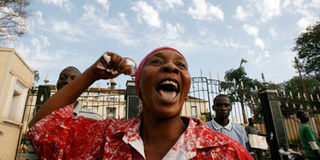Buganda radio station re-opens a year after government purge

PHOTO | FILE
A Buganda woman chants slogans outside the Buganda Parliament in Uganda’s capital Kampala during the clashes that led to the closure of the radio station.
KAMPALA, Sunday
Uganda’s largest kingdom said today its radio station has re-opened more than a year after it was shut down by the government, who accused its broadcasters of “inciting hatred”.
“CBS is on air. We went on air at about 9:30 last night,” said Mr Charles Peter Mayiga, a spokesman from the Buganda kingdom, which owns most shares of the FM station.
“They called our managing director yesterday and he went to the responsible ministry. They handed him the transmitter they had confiscated last September.”
CBS was closed on September 10, 2009, when people loyal to the Kabaka, Buganda’s monarch, began rioting in Kampala over the government’s decision to restrict the Kabaka’s movements within his kingdom.
At least 27 people died during the anti-riot operations conducted by the security services.
Several senior government officials accused CBS of encouraging Buganda loyalists to attack people from Ankole, the tribal home of Ugandan President Yoweri Museveni and many top security officials.
CBS denied the accusations and the government did not make transcripts of the offending remarks available to the public.
Mr Mayiga argued that the government’s decision is linked to Uganda’s upcoming general election.
“Everywhere they went, voters were mentioning CBS,” Mr Mayiga told AFP.
“Some Buganda may be so disillusioned that this makes no difference, but definitely government will do better in the elections after re-opening CBS.” The bush war that brought Museveni to power in 1986 was successful largely due to Buganda’s support.
Many Buganda despised Museveni’s rival, former president Milton Obote, because he outlawed tribal kingdoms and forced the Kabaka into exile.
But Museveni’s popularity in the region has declined partly because he has refused to grant the kingdom its coveted federal status.
Museveni’s re-election in the presidential vote scheduled for late February relies partly on his ability to retain modest support within Buganda, according to some analysts.
Meanwhile, the high fertility rate of Ugandan women is worrying development experts here who are calling for urgent action to prevent the surge in population from becoming a burden. A new population report issued here on Wednesday shows that Ugandan women on average can have seven children each, one of the highest fertility rates in the world.
The 2010 State of Uganda Population report shows that the country’s population is currently estimated at 32 million people. At an annual growth rate of 3.2 per cent, about one million people are added to the country’s population every year.
The report with the theme, ‘Population and Sustainable Development: Emerging Challenges, Opportunities and Prospects’ shows that if the growth trend continues, Uganda’s population will hit 103 million by 2050.
It is this trend that is worrying experts who argue that the population growth is increasing at a much faster pace than the country’s resources.
Statistics from the Finance Ministry show that with the current fertility rate of seven children, the country’s efforts to achieve and sustain Universal Primary Education (UPE) will be affected. They indicate that the number of primary school pupils will increase from 7.5 million in 2007 to 18.4 million in 2037.
This indicates that in addition to the need to train, recruit and retain more teachers, Uganda will need more schools and primary expenditures will be much larger with high fertility. (AFP, Xinhua)




